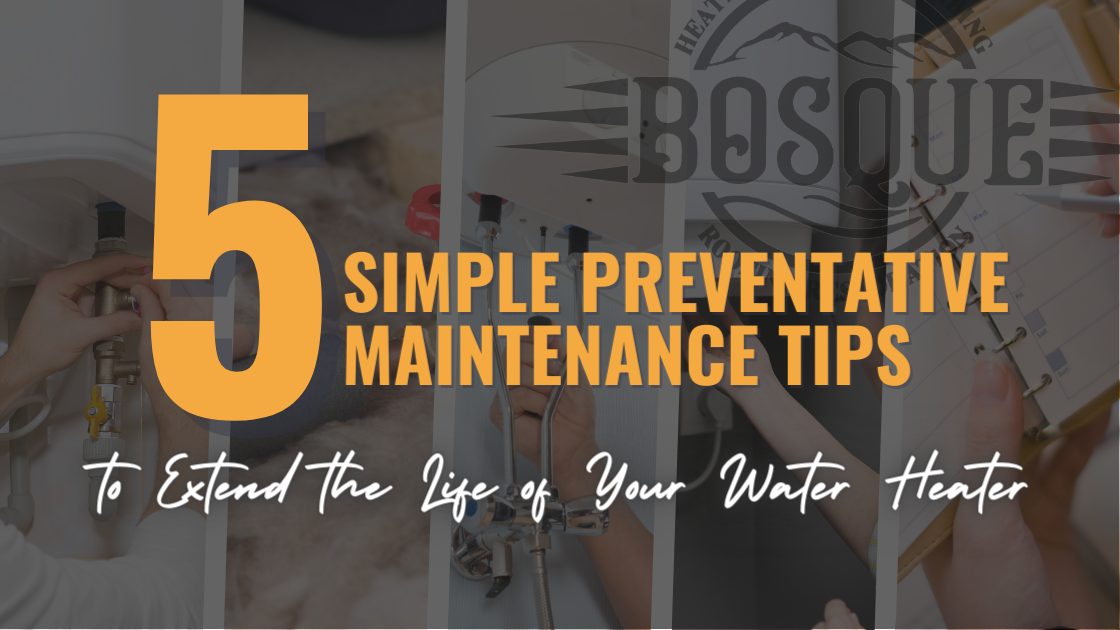5 Simple Preventative Maintenance Tips to Extend the Life of Your Water Heater
No one enjoys the expense of having to replace a major home appliance, including your water heater. But the good news is, if you take good care of it, you can extend its life so you can get the most use out of it.
In this article, we’ll share with you 5 simple ways you can extend your water heater’s lifespan. A few of these items are a one-time task, while others will need to be completed annually.
Annual Water Heater Maintenance vs One-Time
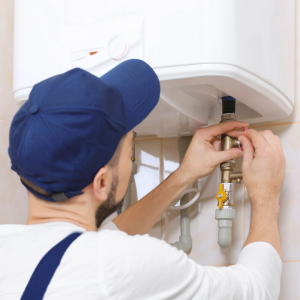 If you want your hot water heater to perform for as long as possible, you’ve got to give it some love! Just like with a car, there are maintenance items that should be performed regularly, and things that only need to be done once. We’ll break down these water heater maintenance tips so you can take the steps that you can on your own, and hire out anything you don’t feel comfortable doing yourself (or aren’t able to.)
If you want your hot water heater to perform for as long as possible, you’ve got to give it some love! Just like with a car, there are maintenance items that should be performed regularly, and things that only need to be done once. We’ll break down these water heater maintenance tips so you can take the steps that you can on your own, and hire out anything you don’t feel comfortable doing yourself (or aren’t able to.)
Gas water heaters vs electric water heaters
Before we launch into this list, it’s worth saying that all of these maintenance tips can be used on both gas and electric water heaters. The main difference between the two is where the energy comes from to heat the water—gas or electricity.
Because while gas heaters are less efficient than electric water heaters, electricity is generally more expensive than gas. So taking these steps can help reduce your energy costs regardless of the type of heater you have.
Insulate Your Water Heater Tank
This professional or DIY one-time service helps extend the life of your water heater, especially when your heater is in a colder environment. Here in Albuquerque, while we do have mild winters, we all know the temperatures can drop over night. And if you live at a higher altitude, you experience colder temperatures all around.
Why does this matter? If the water coming into your tank is cold, or if the water in your tank is cold, it puts more pressure on the heater to perform. If you have your hot water heater insulated, it doesn’t have to cycle as often or work as hard. The water heater’s efficiency is increased because it can keep the water in the tank warmer for longer.
How do I insulate my water heater?
Insulating your water heater is relatively simple. You can buy insulating blankets at the hardware store and some utilities even offer discounted insulation blankets. PNM unfortunately does not. But if you’re not a PNM customer, it’s worth asking your utility.
Most insulation blankets come with tape, but if yours doesn’t, you’ll need electric tape. Other than that, it’s as simple as wrapping the blanket around the water heater tank, cutting out a hole for the controls, and taping it on there! Visit this article from energy.gov for a detailed guide.
Insulate Your Plumbing Pipes
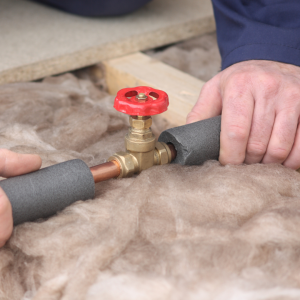 This is another one-time service that you may be able to do on your own, or you may want to hire out. Insulating your plumbing pipes allows water to stay warmer longer as it travels through the house. It also means the water heater doesn’t have to work as hard to get you the water you need.
This is another one-time service that you may be able to do on your own, or you may want to hire out. Insulating your plumbing pipes allows water to stay warmer longer as it travels through the house. It also means the water heater doesn’t have to work as hard to get you the water you need.
Pipe insulation is best for exposed pipes in an unfinished basement or on the exterior of the home. Buy pipe insulation at the hardware store, along with electric tape, and place it around exposed pipes in your home.
Not only will this extend the life of your water heater, but it can prevent potential damage from a burst pipe, and help reduce your energy costs.
And, if you don’t want to or aren’t able to DIY this project, you can certainly hire a plumber or handyman to do it for you!
Perform a Water Heater Flush
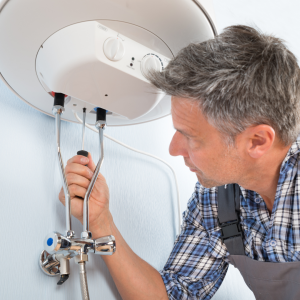 Performing a water heater flush is something you should do annually to flush the sediment out of the bottom of your tank. When there is a sediment buildup, your water heater has to work harder to increase the water temperature.
Performing a water heater flush is something you should do annually to flush the sediment out of the bottom of your tank. When there is a sediment buildup, your water heater has to work harder to increase the water temperature.
Should you flush your water heater yearly?
A flush is something you should do yearly. And if you aren’t comfortable doing it yourself, it’s something that a plumber can do for you during a water heater maintenance appointment. Especially in New Mexico where we have hard water, sediment builds up quickly, so it really does need to be done annually.
How to flush your water heater?
If you want to flush your water heater yourself, here’s what you need to do.
- Turn the knob on your water heater thermostat to “off.”
- If you have a gas water heater, turn the gas to the heater off.
- Turn off the cold water supply on the cold water valve.
- Turn on the hot water in a sink or tub and leave it on to prevent a vacuum from forming.
- Connect a garden hose to the drainage spigot and bring the other end of the hose outside, or place in a bucket.
- Turn on the spigot and drain until the water runs clear.
- Flush the water tank by turning the cold water spigot back on. Let it run until the water running out of the hose is clear.
- Once little to no sediment is coming out, undo each of these steps still you’re back to your usual set up—gas back on, water in the sink off etc. After about 20 minutes, test that hot water comes out of your sink, and you’re good to go!
Lower the Water Heater Temperature
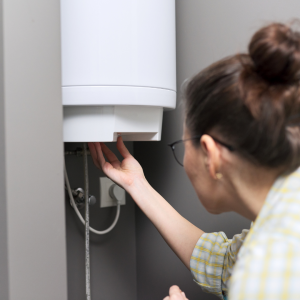 Another thing you can do annually is to play with a lower temperature on the heater to see if it still meets the demands of your family. Higher temperatures mean heaters have to work harder, and you may not necessarily need the water to be that hot. If you can get by with a lower temperature, you may be able to extend the life of your water heater.
Another thing you can do annually is to play with a lower temperature on the heater to see if it still meets the demands of your family. Higher temperatures mean heaters have to work harder, and you may not necessarily need the water to be that hot. If you can get by with a lower temperature, you may be able to extend the life of your water heater.
If you haven’t done this before, it’s time to get acquainted with your water heater. You’ll find a red temperature knob either underneath a small panel on the water heater, or somewhere on the exterior. Most dials on water heaters aren’t labeled with numbers, so you may want to just try turning the knob one notch lower and see how it works for your household use.
Decreasing the temperature will also reduce the risk of possible scalding injuries.
Schedule Annual Water Heaters Maintenance
 It’s important to perform maintenance on your water heater annually, especially as it begins to age. The average lifespan of a water heater is 8-12 years. So as you’re approaching the 8-year mark, annual maintenance will ensure you can get the most out of your heater.
It’s important to perform maintenance on your water heater annually, especially as it begins to age. The average lifespan of a water heater is 8-12 years. So as you’re approaching the 8-year mark, annual maintenance will ensure you can get the most out of your heater.
Do water heaters require maintenance?
You might be thinking, “I’ve never had my water heater serviced before. Why would I start now?”
Yes, you may have gotten away with not performing maintenance. But will your water heater have a shorter lifespan because of that? Are your energy bills higher than they need to be because your water heater is working too hard?
Draining and flushing the system is the most important part of a regular maintenance appointment. So if you’re doing this on your own, that’s a great first step. But if you hire a plumber to perform maintenance, they’ll also make sure all the components are still in working order, and recommend to you when it is time to replace it. You’d hate to have a leak due to corrosion and have that be the signal for you to get a new unit.
What If the Water Tank Stops Working?
Hopefully, this blog showed you there are many things you could do on your own to extend the life of your water heater. If you’re feeling like your water heater has been neglected for too long, schedule a maintenance appointment today with Bosque Heating, Cooling and Plumbing. Or, if you know your water heater has reached the end of its lifespan, contact us about a water heater replacement.
